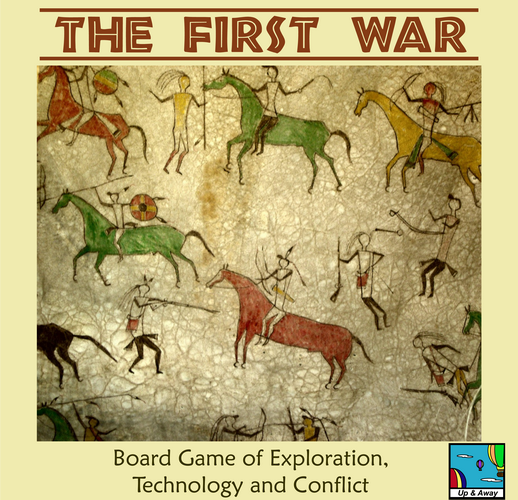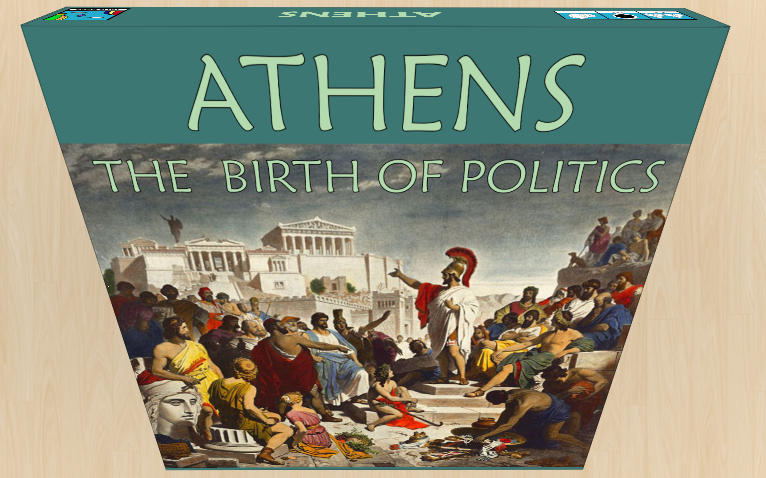













|

|
DESIGNER DIARY
by Rick Heli I thought it might be fun to write something about my game design projects, something I've never tried before. |
September 25, 2018
Three months seems to be becoming the update interval, but maybe that's okay.
At least it seems to ensure that there's plenty to report and I don't waste
your time.
The biggest news since last time is the game I photo-teased is now a
reality:
Inventing the Future..
Really loving the artwork on this one, for a change not done by me, but by the
mysterious Zee Vijg, about whom I know virtually nothing, including the state
or country in which he or she lives. But the art looks truly great. For cover
art we were happily able to secure rights from noted visual artist
Jonathan Stephens.
But what about the game play? Essentially this falls into the risk management
family. It includes ten dice in five colors, six of which the players roll
each round. Players each draft one in order to make selections on their
individual boards. By these means they gain workers, money and the ability
to make progress on paths that are only slowly revealed (via cards).
What I really enjoy about playing this one is that one of the things you choose
are the resolution phases, so you don't know going in what the phases are
going to be, and in what order they will occur. This kind of cognitive
dissonance is an interesting challenge.
My other favorite element is that you will have various conflicting goals
on each round. The dice may not be immediately cooperative in helping you
reach them, however. So what are you willing to compromise on and what will
do you determine is absolutely essential? Or, put another way, what rolls
can you live with and which can you not?
At forty-five minutes, this is one of my quickest-playing games as well.
In other news, the Ancient Athens game is now in blind testing. This has
already yielded results. Turns out that flipping between the terminology
section and the rest of the rules can be annoying so now there is a twenty-page
main rules booklet and an eight-page supplement that includes the glossary,
scenario setup information and player notes. This should make things a lot
easier and you could even have two different people looking things up
during play if necessary. In addition, all the charts and tables are on a
single 10x10" mat, making them easy to find. Most of the tables are also
on regular playing cards for players to have handy.
I've also made a number of refinements on my own. I found a way to
significantly reduce the number of chits, for example, which has a
correspondingly good effect on the price.
On the Founding Fathers sequel front, graphic design continues. Soon
we hope to be able to order a proof copy to make sure everything looks good.
I'll do some playtesting with these components to make sure all works smoothly.
I'm also planning a special goody that can be used as a variant for the
original game.
Finally, the new design work was prompted by a conversation on social media.
A Twitter user had remarked that too many trading
games are set in the Mediterranean. This reminded me I have a trading game
design set in the Indian Ocean, which I have now been developing further.
It's also a much smaller and shorter game than the Athens one, which makes
for a nice change of pace. More about this one in future posts.
That's about it for now. Until next time, happy gaming!
June 19, 2018
Hello again. Three months have passed already since last time, but there is
plenty of news.
First, refinement and streamlining of the Athens game continues. Previously
the game was tracking two Statesmen quantities: Popularity and Approval.
Could the two concepts be combined to make things easier and reduce component
costs? Yes, they could. On the other hand, Coups were a matter of cardplay.
Could this process become more interesting? Yes, now it will include movement
of units on the board in a fun mini-game. There are new options for player
turns as well, just to give players more agency, and dilemmas. And so on. Of
course each change requires more testing, and more comoponent orders from
The Game Crafter, but their number grows smaller each time.
Second, graphic design is progressing on the Founding Fathers
sequel. Statesmen are mostly complete, as are board and box cover. Action
cards are currently in progress, and following that the Issues and
miscellaneous cards and play aides. Here are some glimpses of preliminary
art that may yet change:


|

Meanswhile, a rendering of how the box may appear:

November 17, 2017
Some pictures of how it's going so far ...
August 24, 2017
Unfortunately, it has been well over
a year since I have provided any updates
here. In the meantime though, I have been
very busy publishing other games,
including, in order:
When this arrives I'll subject it to healthy doses of playtesting and see what we have.
For now I have decided that the entire project as I originally conceived it was just too large. Consequently, I have lopped off the first (Oligarchy and Tyranny) and the last (the coming of Alexander the Great) eras. With it I have removed all the rules and components necessary for changes in government type. The good news is that the game is already fun and interesting enough without these features. But never fear; I will make them available as a separate expansion kit for any who may want them.
Meanwhile, I want to discuss briefly some of the new wrinkles in the
The Republic of Rome™
system.
Factions
Reflecting Athenian society of the time, each Statesman belongs to one of
three classes, and these are all historical, as far as I can determine, anyway.
Aristocrats
live in the city, but have extensive wealth, land holdings and followers.
Merchants/Artisans
tend to live on the coast and are either traders or practice a craft.
Farmers
live on the land, growing wheat, olives, figs and sheep.
Each player takes a faction of a particular type. In a six-player outing
there are two players for each type. Each faction consists of characters
of that type only. Players may only draft characters from their own class,
but can persuade characters of any type. Which could come in handy if you've
picked up an income card that doesn't work with your type.
Persuasion
For a while now I've thought that persuasion is too easy. You can decide you
want to ask someone to join your faction and bang! the persuasion party starts
right up. In real life wouldn't it be a more gradual process? You would express
your interest. They would think about it. You would think more about it. And
then you would see. This kind of "pre-persuasion" is in the game now. When you
want to persuade someone, you start the process one turn in advance. This
affords the target faction some form of early response, including making
the target the faction leader. At which point you may switch targets. But
the target faction may regret changing their faction leader. And in any case,
if players feel the need to pick on a leader, they can only protect one
character in this way.
Aging
We don't have birth years for most of the characters in the game. Thus I
am using relative ages. The at-start characters are all the oldest –
assigned in round-robin fashion – and as new characters enter, they
place their chits in line behind the youngest one. The entire queue is
actually implemented as a loop so you never need to slide chits around.
There are no family cards either. Each character is himself only; once dead
he is out of play forever.
Next Time
I was going to talk about Changes to Government Type and Countering a Tyrant,
but as this has probably gone on far enough, I will save them for next
time. They are only in the expansion kit anyway. I still want to discuss
other topics such as event handling, dealing with the huge Persian forces
and the appetite of the thetes for war.